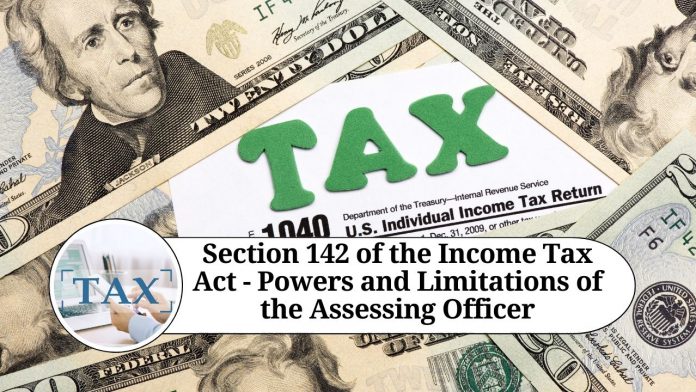Section 142 of the Income Tax Act empowers income tax authorities to make inquiries, examine witnesses, and call for documents during the assessment or reassessment of income tax returns filed by taxpayers. The section is an important provision that is aimed at ensuring that taxpayers pay the correct amount of tax and preventing tax evasion and avoidance.
Power to require the production of accounts, documents, or other evidence
The section begins by stating that the assessing officer may require the taxpayer to produce accounts, documents, or other evidence to make an assessment or reassessment. The taxpayer must comply with this requirement and provide the necessary information to the assessing officer.
Failure to comply with the requirement can result in penalties and legal action. Therefore, taxpayers need to ensure that they have all the necessary documents and information to support their income and assets.
Power to make inquiries and examine witnesses
In addition to requiring the taxpayer to provide information, the assessing officer also has the power to make inquiries and examine witnesses. This means that the assessing officer can question the taxpayer or any other person who may know the taxpayer’s income or assets.
The assessing officer can also summon witnesses and compel them to produce relevant documents or provide information. The purpose of these powers is to ensure that the assessing officer has access to all relevant information to make an accurate assessment of the taxpayer’s income and assets.
Issuing of notices to third parties
The section also provides for the issuing of notices to third parties who may have relevant information about the taxpayer’s income or assets. This could include banks, financial institutions, or any other person who may have information about the taxpayer’s financial affairs.
The purpose of issuing notices to third parties is to ensure that the assessing officer has access to all relevant information about the taxpayer’s income and assets. This is important to prevent tax evasion and avoidance.
Limitations and safeguards
It is important to note that the powers granted under Section 142 are subject to certain limitations and safeguards. The assessing officer must have a reasonable belief that the information or documents being requested are relevant to the assessment or reassessment process.
The assessing officer must also provide the taxpayer with an opportunity to be heard before making any adverse decision based on the information or evidence gathered. This ensures that the taxpayer’s interests are protected and that the assessing officer’s powers are not abused.
Final Conclusion
In conclusion, Section 142 of the Income Tax Act provides the assessing officer with wide-ranging powers to gather information and evidence during the assessment or reassessment process. These powers are important to ensure that taxpayers pay the correct amount of tax and to prevent tax evasion and avoidance.
However, these powers are subject to certain limitations and safeguards to protect the interests of the taxpayer. Therefore, taxpayers need to ensure that they comply with the requirements of the section and provide all the necessary information and documents to the assessing officer.
Here are some frequently asked questions about Section 142 of the Income Tax Act:
What is Section 142 of the Income Tax Act?
Section 142 of the Income Tax Act is a provision that grants the income tax authorities the power to make inquiries, examine witnesses, and call for documents during the assessment or reassessment of income tax returns filed by taxpayers.
What is the purpose of Section 142?
The purpose of Section 142 is to ensure that taxpayers pay the correct amount of tax and to prevent tax evasion and avoidance. The section empowers the income tax authorities to gather information and evidence to make an accurate assessment of the taxpayer’s income and assets.
Who can exercise the powers under Section 142?
The powers under Section 142 can be exercised by the assessing officer, who is appointed by the income tax authorities to assess or reassess the taxpayer’s income tax returns.
What kind of documents can be requested under Section 142?
The assessing officer can request the taxpayer to produce accounts, documents, or other evidence that are relevant to the assessment or reassessment process. This could include bank statements, invoices, receipts, and other financial records.
What happens if the taxpayer fails to comply with the requirements of Section 142?
If the taxpayer fails to comply with the requirements of Section 142, the assessing officer can impose penalties and take legal action against the taxpayer.
Are there any limitations or safeguards on the powers under Section 142?
Yes, the powers under Section 142 are subject to certain limitations and safeguards. The assessing officer must have a reasonable belief that the information or documents being requested are relevant to the assessment or reassessment process. The assessing officer must also provide the taxpayer with an opportunity to be heard before making any adverse decision based on the information or evidence gathered.
Can the assessing officer summon third parties to provide information?
Yes, the assessing officer can issue notices to third parties who may have relevant information about the taxpayer’s income or assets. This could include banks, financial institutions, or any other person who may have information about the taxpayer’s financial affairs.
Can the taxpayer challenge the powers of the assessing officer under Section 142?
Yes, the taxpayer can challenge the powers of the assessing officer under Section 142 if they believe that the assessing officer is exceeding their powers or is not following the due process of law. The taxpayer can appeal to higher authorities or approach the courts to challenge the decision of the assessing officer.




















